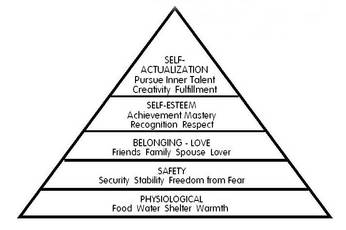
As a sales manager or director you have many factors to consider when formulating your motivation strategy, but a good starting point is Maslow's Hierarchy of Needs (opposite).
Ask yourself a few questions...
1. Physiological: Have you created a safe and pleasant working environment where your sales people do not begrudge spending time? Are they equipped with the correct tools to perform their job? Is sustenance readily available for them to refuel?
2. Safety: Is there an adequate level of security and stability in the working environment or is everyone spending so much time looking over their shoulder and worried about being dismissed that they can't concentrate on the task in hand?
3. Belonging - Love: Is your room of sales people a 'team'? Do they work together, share, help and encourage each other? What can you do to develop a team ethos?
4. Self-Esteem: How do you define achievement and success? How do you monitor it, recognise it and reward it to ensure it is an experience which drives the recipient to do even more, and for those looking on, to aspire and work to emulate the feat?
5. Actualisation: What do you need to do to nurture your sales people to pursue their inner talent, release their creativity and ultimately experience fulfillment? How do you help individuals and teams optimise their potential?
Point 1. is easily addressed by your 'ops' person, be that a COO or an office manager, but from point 2. onwards it all comes down to the company culture, the way culture is communicated and brought to life through it's senior, middle management and staff. It is not enough to have a snappy strap line and a mission statement framed in the reception area. Every member of the company needs to understand company values and what that means in terms of standards of behaviour.
As an owner or MD/CEO of a business, no matter what size, the company ethos must be lived to set the example. A company which sets out to be energetic, nimble and decisive must have leaders and staff who reflect those attributes. Hiring people with those personality traits at front of mind will help create teams of like minded individuals which should amplify the core message.
Nowhere is this more important than your sales and marketing teams. Hire for attitude and train aptitude. With luck, your best hires will already have both. The challenge is then to keep your team motivated and driven. Use the hierarchy of needs to constantly pulse check actions and initiatives. Is your new scheme or idea aimed at enhancing a feeling of belonging or is it to push your top performers to feel greater self-esteem? How many people will this effect? Will it have a potential negative effect on those still struggling to settle in the company?
Change is often good. Embrace change. But remember to consider how proposed changes will affect others the change is not aimed at.
Ask yourself a few questions...
1. Physiological: Have you created a safe and pleasant working environment where your sales people do not begrudge spending time? Are they equipped with the correct tools to perform their job? Is sustenance readily available for them to refuel?
2. Safety: Is there an adequate level of security and stability in the working environment or is everyone spending so much time looking over their shoulder and worried about being dismissed that they can't concentrate on the task in hand?
3. Belonging - Love: Is your room of sales people a 'team'? Do they work together, share, help and encourage each other? What can you do to develop a team ethos?
4. Self-Esteem: How do you define achievement and success? How do you monitor it, recognise it and reward it to ensure it is an experience which drives the recipient to do even more, and for those looking on, to aspire and work to emulate the feat?
5. Actualisation: What do you need to do to nurture your sales people to pursue their inner talent, release their creativity and ultimately experience fulfillment? How do you help individuals and teams optimise their potential?
Point 1. is easily addressed by your 'ops' person, be that a COO or an office manager, but from point 2. onwards it all comes down to the company culture, the way culture is communicated and brought to life through it's senior, middle management and staff. It is not enough to have a snappy strap line and a mission statement framed in the reception area. Every member of the company needs to understand company values and what that means in terms of standards of behaviour.
As an owner or MD/CEO of a business, no matter what size, the company ethos must be lived to set the example. A company which sets out to be energetic, nimble and decisive must have leaders and staff who reflect those attributes. Hiring people with those personality traits at front of mind will help create teams of like minded individuals which should amplify the core message.
Nowhere is this more important than your sales and marketing teams. Hire for attitude and train aptitude. With luck, your best hires will already have both. The challenge is then to keep your team motivated and driven. Use the hierarchy of needs to constantly pulse check actions and initiatives. Is your new scheme or idea aimed at enhancing a feeling of belonging or is it to push your top performers to feel greater self-esteem? How many people will this effect? Will it have a potential negative effect on those still struggling to settle in the company?
Change is often good. Embrace change. But remember to consider how proposed changes will affect others the change is not aimed at.
Image Credit: McLeod 2007


 RSS Feed
RSS Feed
